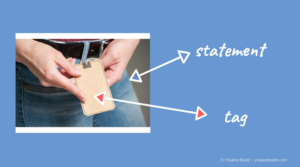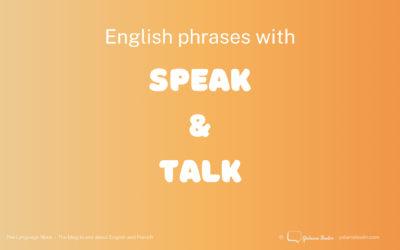Question tags, also called tag questions are commonly used in English, especially in spoken English.
What are question tags?

A tag is like a label. For example, you will see price tags attached to products in a shop.
A question tag is the same: a small piece with words in the form of a question, attached to a sentence. Look at this image and think of questions tags like this: the piece of clothing is a statement, and the tag, well, is the question tag.
In other words, a question tag is a short question that comes at the end of a sentence, i.e.:
- You speak English, don’t you? → “you speak English” is the statement (or the sentence), “don’t you” is the question tag. In writing, there’s always a comma between the statement and the question tag.

Why use question tags?
Question tags are used to ask for agreement or for confirmation.
- Asking for agreement:
This place is really nice, isn’t it?
- Asking for confirmation:
You’re from Scotland, aren’t you?
In a conversation, you can hear if the question tag is used to ask for agreement or confirmation according to the intonation.
If it is used to ask for confirmation, the intonation goes up at the end of the question tag.
If it is used to ask for agreement, the intonation goes down at the end of the question tag.
To remember that, note that asking for confirmation is close to asking a “real” question, hence the rising intonation. However, when asking for agreement, the question tag is more like an added statement, hence the falling intonation.
How are question tags formed?
The question tag is always negative after a positive statement and always positive after a negative statement.
Remember :
statement
question tag
+
–
–
+
There are two ways of adding a tag question, depending on the verb that is used in the first part of the sentence: with an auxiliary verb or with a non-auxiliary verb.
With auxiliary verbs, i.e the verbs to be, to have, and all modal verbs such as can, could, will, would, should…:
If there is an auxiliary verb in the statement, use the same auxiliary verb in the question tag – but don’t forget to reverse positive and negative forms and note that forms are always contracted in the question tag (except in extremely formal speech).
Look at these examples:
| Auxiliary verbs |
+ → – |
– → + |
| be (is) | She is Canadian, isn’t she? | She isn’t Canadian, is she? |
| be (were) | We were right, weren’t we? | We weren’t right, were we? |
| be (am) | I’m allowed in, aren’t I? | I’m not allowed in, am I? |
| have | They’ve drunk beer, haven’t they? | They haven’t drunk beer, have they? |
| can | You can ski, can’t you? | You can’t drive, can you? |
| could | Years ago, we could run fast, couldn’t we? | Years ago, we couldn’t run fast, could we? |
| will | She will come, won’t she? | She won’t come, will she? |
| would | He’d (= he would) like to travel, wouldn’t he? | He wouldn’t like to travel, would he? |
| should | I should go now, shouldn’t I? | I shouldn’t go now, should I? |
Careful! With I am, as you can see in the third example, the tag should be am I not, but this is extremely rarely used today, if not at all. Instead, use aren’t I.
With non-auxiliary verbs, use do, don’t, does, doesn’t, did, didn’t as you would to ask a question or form a negative statement.
Look at these examples:
| Non-auxiliary verbs |
+ → – |
– → + |
| work | You always work late, don’t you? | You don’t always work late, do you? |
| sleep | He usually sleeps on his couch, doesn’t he? | He doesn’t usually sleep on his couch, does he? |
| drive | She drove back home, didn’t she? | She didn’t drive back home, did she? |
| explain | I explained the rules, didn’t I? | I didn’t explain the rules, did I? |
There you are! You now know why and how to use questions tags. Congratulations! 🙂
Now that you know how question tags are formed, let’s practice! Try this free online exercise. Don’t forget to use contracted forms in the question tags.





0 Comments